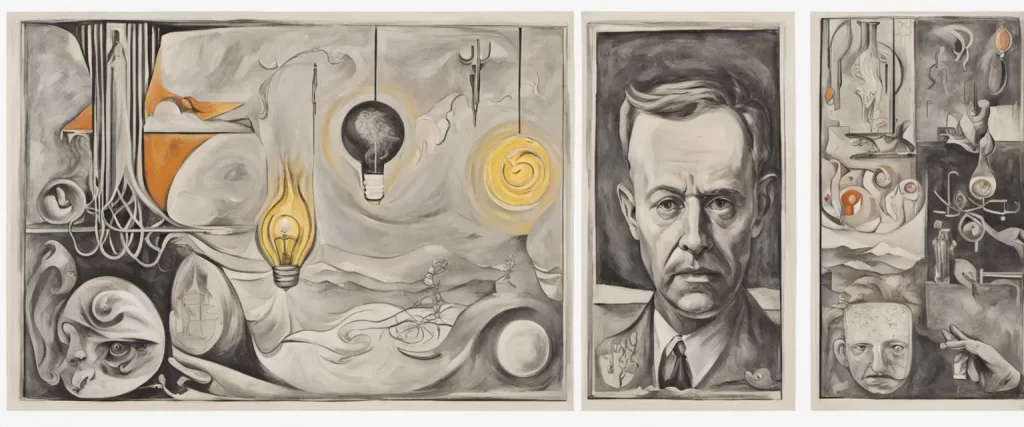
What is Psychology
Psychology is the scientific study of the human mind and behavior. It encompasses various aspects such as understanding how individuals think, feel, and behave, as well as studying the underlying processes that shape human cognition and emotions. Psychologists conduct research to gain knowledge about human behavior and apply these findings to various fields such as clinical psychology, counseling, education, sports, and organizational psychology, among others. Psychology as a discipline aims to explore and understand human behavior, cognition, personality, emotions, and mental processes.
What Can We Get From Psychology?
Psychology offers a wide range of benefits and insights that can enhance various aspects of our lives. Some of the things we can get from psychology include:
1. Understanding human behavior: Psychology helps us understand why people think, feel, and behave the way they do. It allows us to grasp the complexities of human behavior and gain insights into different personality types, motivations, and cognitive processes.
2. Self-awareness and personal growth: Psychology enables individuals to gain a deeper understanding of themselves, their emotions, and their thought patterns. It helps promote self-reflection, self-acceptance, and personal growth by exploring our strengths, weaknesses, and areas for improvement.
3. Improved relationships: Understanding psychology can enhance our interpersonal skills and enable us to build and maintain healthier relationships. It provides insights into effective communication, conflict resolution, empathy, and emotional intelligence, helping us navigate various social interactions.
4. Mental health and well-being: Psychology plays a crucial role in promoting mental health and well-being by providing tools and techniques to manage stress, anxiety, depression, and other mental health issues. It offers therapeutic interventions like cognitive-behavioral therapy, counseling, and mindfulness practices to improve overall mental health.
5. Decision-making and problem-solving: Psychology helps us analyze and evaluate information more effectively, enhancing our decision-making and problem-solving abilities. It provides frameworks and approaches to overcome biases, make rational choices, and solve complex problems by considering various factors and perspectives.
6. Performance enhancement: Psychology offers techniques and strategies to enhance performance in various domains, such as education, sports, and work. It provides insights into motivation, goal-setting, resilience, and concentration to optimize performance and achieve desired outcomes.
7. Social influence and behavior change: Understanding psychology helps us comprehend the factors that influence our behaviors and decision-making processes. It provides insights into persuasion, conformity, and behavior change techniques, allowing individuals and organizations to create effective strategies for influencing and promoting positive behaviors.
8. Social justice and advocacy: Psychology contributes to the promotion of social justice by studying and addressing issues related to inequality, prejudice, discrimination, and social biases. It helps in the development of interventions and policies to reduce social disparities and foster inclusivity.
These are just a few examples of what we can gain from psychology. Overall, psychology provides valuable knowledge, insights, and tools that can improve various aspects of our lives and promote well-being.
Strategies in Learning Psychology
1. Active engagement: Psychology is best learned through active engagement. This can involve participating in discussions, asking questions, and relating the concepts to real-life examples. Engage in activities that require you to apply the theories and principles you are learning.
2. Make connections: Psychology is an interdisciplinary field, so making connections with other subjects can enhance your understanding. Relate psychological concepts to biology, sociology, neuroscience, or any other relevant fields. This will allow you to see the bigger picture and understand the interconnectedness of different areas of study.
3. Utilize various resources: Diversify your learning resources. Apart from textbooks, explore online articles, scholarly journals, TED Talks, podcasts, and documentaries related to psychology. This will expose you to different perspectives and help you develop a deeper understanding of the subject.
4. Take notes and summarize: Taking detailed notes during lectures or while reading can improve retention and comprehension. Summarize key points in your own words, as this will help consolidate the information in your memory. Additionally, writing down questions or areas of further interest can guide your continued learning.
5. Use mnemonic devices: Psychology often involves memorizing various theories, terms, and concepts. Mnemonic devices such as acronyms, rhymes, or visualization techniques can assist in remembering complex information. Create your own memorable sayings or images to recall key concepts.
6. Apply concepts in real-life situations: Psychology is relevant to everyday life. Look for opportunities to apply concepts you are learning to real-world situations. Observing and analyzing human behavior in different contexts can deepen your understanding and make the subject more relatable.
7. Practice critical thinking: Psychology requires critical thinking skills to analyze information, evaluate evidence, and form logical arguments. Engage in discussions and debates, evaluate research studies, and challenge assumptions. This will help you develop a more nuanced and well-rounded perspective on psychological theories.
8. Seek out practical experiences: Whenever possible, engage in hands-on experiences related to psychology. This could involve volunteering in settings such as counseling centers, hospitals, or research labs. Practical experience will provide you with a deeper understanding of psychological concepts and their real-world applications.
9. Collaborate with others: Discussing ideas and concepts with peers or joining study groups can enhance learning. Explaining and teaching concepts to others reinforces your own understanding and exposes you to different perspectives. Peer feedback and discussions can also help clarify any areas of confusion.
10. Regularly review and revisit: Psychology is a cumulative subject, so regularly reviewing and revisiting previously learned concepts is essential. Consolidate your knowledge by periodically revisiting old material, as this can improve long-term retention. Repetition and reinforcement are key to successful learning in psychology.

Freud by Peter Gay
Summary
The book “Freud” by Peter Gay is a comprehensive biography of Sigmund Freud, one of the most influential figures in the field of psychology. Gay explores Freud’s personal and professional life, delving into his childhood, early influences, and the development of his groundbreaking theories.
The biography provides insight into Freud’s struggles with antisemitism and his attempts to establish himself as a reputable and innovative thinker in a society that was often hostile towards his ideas. Gay explores Freud’s relationships with his colleagues and patients, shedding light on how these interactions shaped his theories and practices.
Additionally, the book delves into the evolution of Freud’s theories, including the development of psychoanalysis, the interpretation of dreams, and his famous concept of the Oedipus complex. Gay examines the controversies and criticisms that Freud faced throughout his career, highlighting both the lasting impact of his work and the limitations and fallacies that have been identified in his theories over time.
Overall, “Freud” is an engaging and balanced biography that provides a comprehensive overview of Sigmund Freud’s life, work, and enduring influence on the field of psychology and beyond.
Reasons for Recommendation
1. Comprehensive overview of Freud’s contributions: “Freud” by Peter Gay provides a thorough and detailed account of Sigmund Freud’s life, work, and theories. It examines his groundbreaking concepts such as the Oedipus complex, the unconscious mind, and dream analysis, offering an in-depth exploration of his influential ideas. This makes it an excellent resource for psychology students or anyone interested in understanding the origins of psychoanalysis.
2. Balanced critique: While acknowledging Freud’s significant impact, Peter Gay also critically evaluates his work. This book is not a hagiography but presents a nuanced and objective examination of Freud’s theories, discussing their strengths as well as their limitations. This balanced perspective allows readers to have a more comprehensive understanding of Freud’s ideas and their relevance in contemporary psychology.
3. Historical context: Gay situates Freud’s work within its historical and cultural context. By providing an in-depth analysis of the socio-political climate of Freud’s time, the book helps readers understand the challenges and controversies he faced. This historical perspective is crucial for appreciating why Freud’s theories were revolutionary at the time and the subsequent impact they had on the development of psychology.
4. Engaging and accessible writing: Peter Gay’s writing style is engaging and accessible, making the complex concepts of Freudian psychology easier to comprehend for readers with varying levels of knowledge in the field. The book does not assume prior expertise, making it suitable for both students and general readers interested in the subject.
5. Influence on contemporary psychology: Freud’s ideas still have a significant impact on contemporary psychology, and understanding the foundations of psychoanalysis can enrich one’s understanding of various psychological theories and therapeutic approaches. “Freud” by Peter Gay provides an indispensable resource for tracing the intellectual roots of modern psychology, allowing readers to explore the ongoing relevance and controversies surrounding Freudian concepts.
6. Integration of Freud’s personal life with his theories: The book delves into Freud’s personal life, shedding light on the relationship between his experiences and the development of his theories. By exploring Freud’s personal struggles, such as his own neuroses or his relationships with colleagues, readers gain valuable insights into the psychological dynamics influencing his work. This helps contextualize his theories and helps in understanding the man behind the ideas.
Overall, “Freud” by Peter Gay is a highly recommended book for those interested in gaining a comprehensive understanding of Sigmund Freud’s life, theories, and their impact on the field of psychology. It offers a balanced critique and historical context, making it an engaging and informative read for both psychology students and general enthusiasts.

The Art Of Seduction by Robert Greene
Summary
The Art of Seduction” by Robert Greene is a guidebook that explores the principles, strategies, and tactics of seduction from historical figures and everyday characters. Divided into various chapters, the book provides insights into the art of seduction, ranging from the different seductive characters and their techniques to the psychology behind seduction.
The book begins by explaining the seductive character types: Sirens, Rakes, Ideal Lovers, Dandies, Naturals, Coquettes, Charismatics, and Stars. It describes their distinctive traits, methods, and how they use their allure to captivate and manipulate others.
Greene then delves into the various strategies and techniques employed in seduction. These include creating an irresistible persona, mastering the art of conversation, using body language and non-verbal cues, and learning to read and manipulate people’s emotions. The book emphasizes the power of mystery, unpredictability, and powerful storytelling as tools of seduction.
Furthermore, Greene discusses the importance of timing, patience, and persistence in the seduction process. He advises on cultivating both emotional and physical distance to captivate others. Additionally, the book explores the role of seduction in professional and social contexts, offering guidance to enhance charisma and attractiveness in various settings.
“The Art of Seduction” also provides cautionary tales of seduction gone wrong, highlighting the potential dangers and ethical considerations of using such techniques. It emphasizes the importance of being aware of others’ boundaries and avoiding manipulation or harm.
Overall, the book serves as a comprehensive guide to understanding the dynamics of seduction. It offers readers an extensive understanding of human psychology, interpersonal relationships, and the art of captivating others, while emphasizing the need for ethical conduct to build lasting connections.
Reasons for Recommendation
1. Understanding human behavior: “The Art of Seduction” delves into the complex aspects of human psychology and behavior. It explores the underlying motivations, desires, and vulnerabilities that drive individuals to engage in seductive behaviors. By studying these psychological patterns, readers can gain valuable insights into human nature and interactions.
2. Enhancing social skills: Seduction, in its broader sense, involves effectively communicating and connecting with others. This book provides valuable tactics and strategies for improving social skills. It teaches readers to recognize nonverbal cues, adapt communication styles, and understand the subconscious influences that affect our interactions. This knowledge can be useful in various social and professional settings.
3. Self-awareness and personal growth: The book encourages readers to reflect upon their own desires, fears, and insecurities. By uncovering these aspects of oneself, individuals can enhance their self-awareness and personal growth. Understanding one’s own motivations and limitations can lead to better decision-making, improved relationships, and increased emotional intelligence.
4. Analyzing manipulation and persuasion techniques: “The Art of Seduction” sheds light on the psychological techniques that individuals employ in order to manipulate and persuade others. By understanding these tactics, readers can become more resistant to manipulation and better equipped to identify when they are being influenced. This knowledge can help foster healthier relationships and prevent individuals from being exploited.
5. Cultural and historical context: The book presents seduction as a concept deeply rooted in history, culture, and society. It offers a comprehensive analysis of seduction styles throughout different eras and across various cultures. By gaining knowledge about the cultural and historical context of seduction, readers can develop a deeper appreciation for human relationships and societal dynamics.
Note: It is important to mention that “The Art of Seduction” can be controversial, as it touches upon topics of manipulation, power dynamics, and potentially harmful behaviors. It should be approached with caution and readers should exercise critical thinking to differentiate between healthy interpersonal skills and unethical tactics.
The Art Of Loving by Erich Fromm
Summary
The Art of Loving” by Erich Fromm explores the nature of love and how to cultivate fulfilling relationships. Fromm argues that love is not just a feeling, but an art that requires effort, knowledge, and practice. He examines different forms of love, including self-love, brotherly love, erotic love, and maternal love. Fromm challenges the notion of love as a passive state and instead emphasizes the active role individuals must play in nurturing and developing love. He highlights the importance of self-awareness, understanding, and freedom in relationships, and identifies the obstacles that hinder genuine love, such as narcissism, objectification, and societal conventions. Throughout the book, Fromm provides insight, guidance, and practical advice to help readers obtain an authentic and fulfilling love experience.
Reasons for Recommendation
1. Psychological Insight: “The Art of Loving” offers a deep exploration of human psychology, helping readers understand the intricacies of love, relationships, and personal growth. Fromm delves into topics such as the nature of love, the influence of society on our relationships, and the importance of self-love.
2. Relationship Dynamics: Fromm examines different types of love, including motherly, brotherly, erotic, and self-love. By analyzing these dynamics, the book provides valuable insights into the complexities and challenges individuals face in their relationships, from romantic partnerships to familial connections.
3. Psychological Development: Fromm presents his perspective on how love and relationships can impact an individual’s personal growth and psychological well-being. He emphasizes the role of self-awareness, self-acceptance, and self-actualization, providing readers with valuable tools for personal development.
4. Cultural Context: Fromm explores the impact of societal norms and cultural factors on our ability to love authentically. The book analyzes how societal pressures and expectations can shape our understanding of love, guiding readers towards cultivating genuine connections and breaking free from harmful societal influence.
5. Emotional Intelligence: “The Art of Loving” emphasizes the importance of emotional intelligence in relationships, including the ability to understand and express emotions effectively. Fromm offers guidance on developing emotional awareness and improving communication skills, fostering healthier and more fulfilling relationships.
6. Self-Reflection: The book encourages readers to reflect on their own patterns, beliefs, and behaviors in relationships. Fromm prompts self-examination and introspection, leading readers to gain a deeper understanding of their own emotional needs, desires, and fears.
7. Unfulfilled Love: Fromm addresses the modern challenge of unfulfilled love and the rise of loneliness and disconnectedness in society. He provides insightful analysis and strategies for cultivating meaningful connections, helping readers navigate the complexities of love in the modern world.
8. Integrating Theory and Practice: Fromm presents a comprehensive psychological theory of love while offering practical advice and techniques. The book combines theoretical concepts from psychology with real-life examples and actionable steps, making it relevant and useful for readers seeking both knowledge and personal growth.
Overall, “The Art of Loving” is recommended from a psychological perspective due to its profound psychological insights, its emphasis on personal growth and self-reflection, its exploration of relationship dynamics, its examination of cultural influences, and its practical guidance for cultivating meaningful connections.
Pingback: Brave New World: Books that Change and Influence Society
Pingback: Einstein: Science Books to Expand Your Mind
Pingback: Unlocking Enlightenment: 5 Must-Read Philosophy Books You Should Dive Into